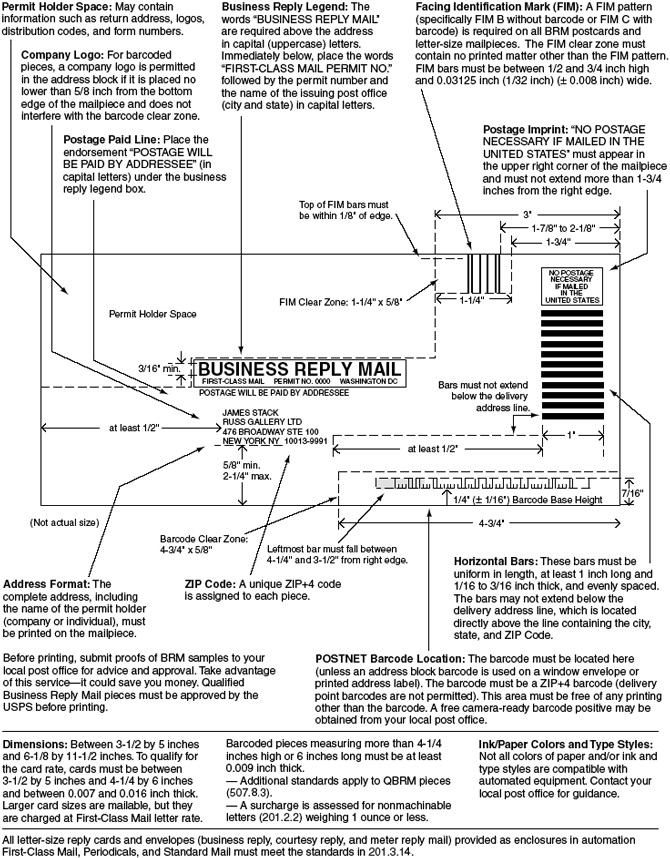| 
Quick Service Guide 507a
Additional Services
Business Reply Mail (BRM)
January 2006
Printer-Friendly
PDF
Overview

For an annual permit fee, a business reply mail (BRM) permit is available
for distributing business
reply cards, envelopes, self-mailers, cartons, and labels. BRM allows
the permit holder to receive First-Class Mail and Priority Mail back
from customers by paying postage only on the mail returned. The BRM permit
holder guarantees payment of First-Class Mail postage plus a per piece
charge for pieces returned by the USPS (see payment options below). When
designing a BRM mailpiece or label, mailers must consult with their local
post office. The piece must conform to a specific format to qualify as
BRM, including a unique ZIP+4 code assigned by the USPS. Proofs for regular
BRM should be approved by the USPS before printing. Proofs for Qualified
Business Reply Mail (QBRM) must be approved by the USPS. On the reverse
is a layout example for a BRM envelope. BRM pieces distributed in automation
rate mailings are required to meet automation compatibility standards.
BRM templates are available on the Postal Explorer web site at pe.usps.com by
selecting "mailpiece design" in the left frame.
Payment Options (507.8)

Basic BRM—Annual permit fee of $160.
Per piece charge of $0.65 plus First-Class Mail postage.
Paid through an advance deposit account or by cash/check on delivery.
Cost per piece
First-Class postage + 65�
Letter (1 oz.) 39� + 65� = 1.04�
Card Rate 24� + 65� = 89�
High-Volume BRM—Annual permit fee ($160) plus a BRM annual
accounting fee of $500 for each account at each delivery unit.
Per piece charge of $0.11 plus First-Class Mail postage. Paid through
an advance deposit account. Best suited if return volume is approximately
950 pieces or more per year.
Cost per piece
First-Class postage + 11�
Letter (1 oz.) 39� + 11� = 50�
Card Rate 24� + 11� = 35�
Basic Qualified Business Reply Mail (QBRM)—Annual permit
fee ($160) plus a BRM annual accounting fee of $500.
Per piece charge of $0.06 plus a lower QBRM automation First-Class
Mail postage rate. Paid through an advance deposit account. Used only
on barcoded automation-compatible cards and letter-size mail weighing
up to 2 ounces if design is approved for QBRM by USPS before distribution
(507.8.3). A unique ZIP+4 code
is assigned by the USPS for each rate category of QBRM to be returned
(one for card-rate pieces, one for
letter-size pieces weighing 1 ounce or less, and one for letter-size
pieces weighing over 1 ounce up to 2 ounces). Best suited if return
volume is approximately 805 pieces or more annually.
Cost per piece
QBRM postage + 6�
Letter (1 oz.) 35.8� + 6� = 41.8�
Card Rate 21.1� + 6� = 27.1�
High Volume QBRM—Annual permit fee ($160) and a BRM annual
accounting fee ($500) and separate quarterly fee of $1,900. Mailers can
pay quarterly fee for any consecutive 3-calendar month period. Per piece
charge $0.008 plus lower QBRM automation First-Class Mail postage rate.
Paid through an advanced deposit account . Best suited if return volume
is approximately 36,450 pieces or more quarterly.
Cost per piece
QBRM postage + 0.8�
Letter (1 oz.) 35.8� + 0.8� = 36.6�
Card Rate 21.1� + 0.8� = 21.9�
Other Post Offices

A BRM permit holder can allow its authorized representatives or agents
to use that permit number to receive BRM at any other post office. The
original permit holder must supply the representative with a letter authorizing
the use of the BRM permit and a copy of the USPS receipt showing the
annual fee payment for that permit. See 507.8.11 for
additional requirements.
Official Mail

Authorized users of official mail may distribute BRM, subject to 703.7.11 and 507.8.
For the specific DMM standards applicable to this category of mail,
consult the DMM sections referenced above and the general sections within
each DMM module.
Business Reply Mail Layout Guidelines (507.8.8)


This guide is an overview only. For the specific DMM standards applicable
to this category of mail, consult the DMM sections referenced above and
the general sections within each DMM module.
Back to Top

|
